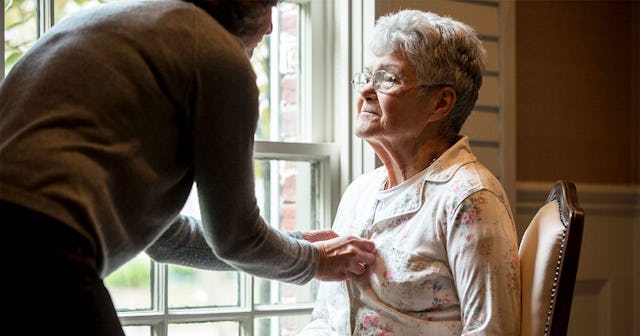What Living With A Chronically Ill Mother Taught Me About COVID-19

As I sit at my kitchen island, dressed in sweats (per my usual COVID-19 work from home attire), drinking coffee, practicing snap words with my kindergartner, and helping my second grade son with his phonics lesson, urgent text messages started to fly in:
“The Governor cancelled school for the rest of the year! I’m actually crying.”
“Holy hell. Here we go. Not surprising, but God it hurts.”
“I don’t know how I am going to survive the summer. I may have to take a leave of absence from work.”
Then I received the robocall and texts from the school telling me what I already knew. This was all before I checked my town’s social media pages, where parents were already commiserating with one another as the long expanse of spring and summer stretched in front of us. The uncertainty over whether schools will open in the fall, and when our regular lives filled with barbecues, weddings, bars and coffee shops may resume, has left many of us suspended in grief for what was — and in despair for what is.
I understand these complicated emotions very well. My mother was diagnosed with multiple sclerosis (MS) at the age of 47 when I was 19 and in college. The onset of the disease was initially slow, but when she relapsed in the years following the diagnosis, I saw my once vibrant and independent mother, who worked the night shift at a manufacturing company, slowly become incapable of moving her lower legs and partially blind in one eye.
It was both devastating and heartbreaking. As a first-generation Indian American, I was used to my mother throwing large parties at our home in New Jersey, Bollywood music playing on the speakers. The smell of samosas and pakoras frying in the kitchen wafted into the living room where my aunties and uncles laughed, gossiped, and told stories in Hindi about the past. All of a sudden, it felt like our fairly idyllic immigrant life had been rudely snatched away with the loss of my mother’s mobility.
Planning for large momentous occasions in life became difficult, like my law school graduation. As my peers planned excitedly for their parents’ visits by booking brunch or dinner reservations, my mother called me and broke the news that her condition had deteriorated severely to the point where she was in a rehabilitation center until she improved. She wasn’t certain if she would make the graduation ceremony.
My breath caught in my throat. I didn’t want her to know how disappointed and how sad I was. She could hear it in my silence and told me how very proud of me she was. She ended up making it after all, but I didn’t know until the day before graduation that she would. However, once I saw her at graduation in a severely limited stage of mobility, I understood why she’d hesitated to fly down.
A few years later, I wasn’t as lucky. She couldn’t make it to India as I shopped for my wedding outfits because sidewalks, stores, restaurants, and places of residence are generally not handicap accessible. As I stood in the cramped merchant’s shop in New Delhi, which was crowded with other brides and their families, I stared at myself in a mirror as the sales associates adjusted my outfits. Tears in my eyes, I felt despondent. My mother’s diagnosis had side-swiped us and changed the trajectory of our lives forever.
Now, with COVID-19 rampaging across our country, the feeling of despondence my mom friends are feeling so acutely is something I’ve been feeling for years. I’ve been through this kind of upending before. The uncertainty, the lack of ability to predict the future, is terrifying. I never imagined that watching my mother live with her chronic illness would prepare me for this unprecedented moment in time, but her illness has taught me some valuable lessons on how to live a full life in the midst of hardship.
First, plan those fun vacation trips with your family, buy those tickets to the next theater show you want to attend, but know that they may be cancelled due to circumstances beyond your control. Living with a chronic illness means that you accept that you have no control over what may happen and that there is no certainty, but you can still hope that all goes well. If it does, like it did at my law school graduation, then you can rejoice. If it doesn’t go well, like it did with my trip to India for my wedding outfits, and now finding out that school has been canceled for the rest of the year, then you can let yourself feel that disappointment — but in your heart you have already accepted that things may not go as planned, and therefore the disappointment may be less acute.
Second, lower your expectations and focus on what you do have. My mom wasn’t there with me in India, but she was alive. Many people walk down the aisle, or have children, their parents never having the joy of witnessing such life-changing events.
Third, let go of the guilt that you may feel for being healthy when others aren’t. There is nothing wrong with appreciating your blessings–in fact, it just might be your saving grace, allowing you to truly live with gratitude for what you do have.
Last weekend, we sat outside in my parents’ backyard, seated far enough to be socially distanced and responsible. The spring sun was warm on our backs, my kids played soccer in the green grass, my mother sat on the deck smiling down at us as we ate her homemade pakoras hot from the oven. Later that afternoon, I rode my bike with the kids and listened as they shouted “yahoo” going down a simple hill on their bikes. And I thought, thanks, Mom.
This article was originally published on